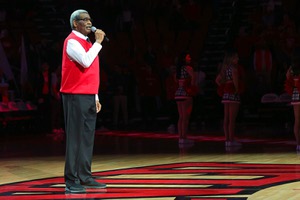The dorm room I’m standing in is tastefully decorated, with vibrant canvasses adorning the cinderblock walls and a plush green couch across from a flat-screen TV. There’s no felt, glow-in-the-dark Bob Marley poster under a black light. No lava lamp. Because this isn’t your typical college student’s digs. It’s UNLV sociology professor Georgiann Davis’ suite inside the school’s Tonopah Complex residence hall. Davis is the first participant in UNLV’s professor-in-residence program, which launched last fall and embeds a faculty member in a student dormitory with the aim of boosting student engagement. We chatted with Davis about her unique experience:
Did you live in residence halls as an undergrad? No, I didn’t. It’s sort of exciting to be doing it now as a professor. And part of the reason is that I’m much like our student body here at UNLV. I am a first-generation college graduate, and I worked throughout all of my college education and was sort of confined to universities near my home. It was something that I always wished I had participated in, especially because I knew once I started college I knew I wanted to be a professor, and some of my best memories of college were interacting with professors out for coffee or for dinner or outside of the classroom. It just sort of broke down these barriers and walls.
I had [a similar] experience at the university I was at before [UNLV]. I worked as part of my service requirement as a faculty fellow and I worked in the residence halls, but they didn’t have a residential-professor program. I thought, “Oh my gosh, what a great opportunity. I can interact with students and meet new colleagues and also live close to work.”
Did you have any apprehensions going into the experience? I guess, logistically, I was worried about the workload—being an assistant professor and thinking about trying to work toward tenure and publishing and being a good professor in the classroom, I was a little bit worried about that. And then also being that it’s a new program here, we don’t know how it’s going to evolve. We have all this research that shows that this type of program is really beneficial to students, in terms of making connections between learning and enriching their experiences and success, completion, time to completion and all of that. … So I guess it was just the workload, but it turned out to work really well. The time I would spend commuting or trying to get involved, it’s made up for just living here on campus, and then also it’s a type of responsibility that’s enjoyable.
Part of the gig is putting on programs for student residents. I think it was last week, right after spring break, I did an activity called Pop-Up Professor Painting, which was more of a social experience. As students were coming back from spring break, I sat outside the lobby—it was a beautiful spring day in Vegas—and I sat outside and was painting. I love to paint (not that I’m good at it), but I was painting with them. … I was shocked that so many people joined. I got enough materials for about 10 or 15 [participants], and 10 or 15 showed up—and it was not announced.
Describe a meaningful moment with a student resident. I have this student who is in my Sociology of the Body undergrad class. I would say about half the time we end up leaving for class at the exact same time. So that’s really cool … just sort of interacting, and then we go into class. It makes it a more comfortable place for her to ask questions. It would be awesome if everyone I was living with was taking classes with me.
Are you learning from the students as well? I think I’m learning again, reminding myself of the challenges that students are facing—especially at a place like UNLV, where we are a minority-serving institution … That’s one of the reasons why [assistant director of residential education] Orlando [White] and I worked together to build the Faculty Fellows program. Because I’m only one person … I only bring my own set of life experiences to interact with the students … Our new Faculty Fellows program [will include] anywhere from six to 16 [instructors]. They’ll actually assign faculty to different residence halls. They won’t be residential, like living in the units—there’s a space issue, time issue and not everyone is up for living in the residence halls given space allocations or family life—but at least these Faculty Fellows can interact with students and maybe some of them can share experiences, I’m sure, that I don’t have.
I’ve learned a lot from them from different discussions we’ve had, and it’s interesting—it’s just like this in the classroom in many ways, that some of the things you learn are unanticipated. So I’ll have a hot chocolate social and I’ll learn about how one student is struggling with home life and feeling like they don’t have a place to go home to for a variety of reasons, and then we talk about that and what that’s like.
What’s your favorite aspect of living in the residence hall? There are so many things. I feel like it’s such a small campus now. Did you go to UNLV?
I did. Go Rebels! When I was here last year as a professor in my sociology department, I felt more alienated from the campus and my colleagues and even students, for sure. Now I feel like, although we have 28,000 students, I almost feel like it’s shrunk dramatically. I know people, people know me more. It just feels much smaller. That’s really rewarding, to be able to live in an institution that cares about research but also has a space here for students to interact. … It’s super cool to be steps away from my office and where I teach. I’m a night owl, so it’s kind of nice to wake up and roll out of bed at 10:45 a.m. [to teach an 11:30 a.m. class], and that’s probably why I cross paths with students going to 11:30 classes. So that’s good. And the Dining Commons is great. I have a real generous food allowance so I don’t have to worry about cooking or preparing meals, which as a person who lives alone, it’s definitely appreciated.
You have the means to do so in your suite’s kitchen. I have the means to do so, but I don’t have the knowledge of how to do so. (laughs) I try, like grilled cheese. I’m limited. Although there is a recipe for me to make quinoa peanut butter treats for [my dog] Penny—that I can do. I just can’t make anything for myself.
On the flip-side, what’s the least desirable aspect of living on campus? I think the only thing, and this probably doesn’t affect many [residential] students, is probably parking. Aside from working here and in my office, I like to go to coffee shops. And if I drive to one or have a meeting at a coffee shop with other people, then [I’ll] come back and I can’t find parking. That’s an issue for UNLV all around. … I think that’s the biggest.
It’s super-quiet. I feel like this a bomb shelter; the walls are so thick. Of course [residents] can hear Penny bark if she gets frustrated with one of the cats, but in general it’s really quiet, it’s relaxed. I feel like I have privacy, which I guess that’s somewhat surprising to people when I tell them that. I sometimes forget, if I’m going to go outside in my pajamas or less clothing (laughs) to do something, that there are windows there. But as far as I know I’m not on like Snapchat or Instagram.
I’m an extrovert; I love people. I really love looking out the window, like just now, and seeing people walk by. It’s great for me. Over winter break when no one was around … I felt it was kind of lonely. And while it was great to do laundry at prime time it really was still kind of like, “Oh, I miss everyone.”
You’re not completely alone. You have your cats, your birds and, of course, your French bulldog, Penny. I think she’s more popular than I am. I know that.
You’re surrounded by iPhone-wielding millennials keeping up with all the latest trends. Have you noticed anything? Well Yik Yak is huge. How old are you?
I’m 29. I’ve never heard of Yik Yak. I’m 35, so we’re out of touch—I’ll be honest with you. Yik Yak is where people can sort of anonymously, I guess, post. … Think about it like Twitter, but without tying yourself to it, and it’s within a radius of like one or two miles, I don’t know the details. … People say, “Oh hey, what’s in the Dining Commons today?” or people will say things like, “Hey, I’m horny.” I don’t know. (laughs) But these are college kids, and it’s a part of the culture and life and all of that. … They’ll [also] say things like, “Hey, who’s taken Soc 101 and what instructors do you like?”








